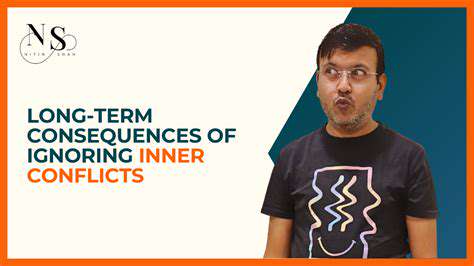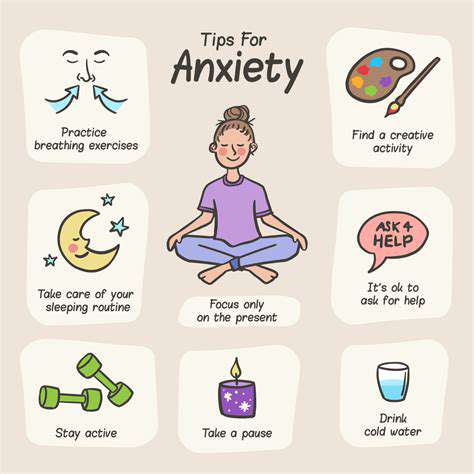Identifying Signs of Anxiety and Stress in Daily Life
Physical Signs of Anxiety and Stress
Common Physical Symptoms
Anxiety and stress manifest in various physical symptoms that can interfere with daily life. Some of the most common signs include muscle tension, headaches, and stomach issues. When a person experiences anxiety, their body goes into a state of heightened alertness, often resulting in increased muscle tension.
Headaches, whether tension headaches or migraines, are another prevalent symptom linked to anxiety and stress. The constant strain and tightness in the neck and shoulder muscles can contribute to these types of headaches.
Gastrointestinal disturbances, such as nausea, diarrhea, or a feeling of an upset stomach, are also frequent complaints among those experiencing anxiety. The gut is sensitive to emotional stress, and many people notice that their digestive system reacts to their anxiety levels.
Some individuals may experience rapid heartbeat or palpitations when feeling particularly anxious or stressed. This reaction is part of the body's fight-or-flight response, where adrenaline is released into the bloodstream, preparing the body to respond to perceived threats.
Others might report fatigue or a sense of exhaustion, even after a full night's sleep. Anxiety can be mentally and physically draining and can disrupt sleep patterns, leading to a feeling of being constantly tired regardless of rest.
Behavioral Indicators of Anxiety and Stress
In addition to physical symptoms, anxiety and stress can also affect behavior significantly. Individuals may start to withdraw from social situations or activities they once enjoyed due to the overwhelming feeling of anxiety. This withdrawal can lead to increased isolation and difficulty maintaining relationships.
Changes in appetite are also common; some may eat excessively as a form of comfort, while others may lose their appetite completely. These changes can further impact physical health and emotional well-being.
Increased irritability or mood swings can be another behavior change for those dealing with anxiety. Simple annoyances may provoke stronger reactions, leading to conflicts with friends and family.
Difficulty concentrating is a behavioral sign many experience when overwhelmed by anxiety. The mind may feel cluttered, making it hard to focus on tasks at work or home, potentially leading to decreased productivity.
Some individuals may resort to unhealthy coping mechanisms to manage their anxiety, such as substance abuse or compulsive behaviors. These coping strategies can exacerbate the underlying issue rather than provide relief, leading to a cycle of stress and anxiety.
Emotional and Behavioral Indicators
Common Emotional Symptoms
Anxiety and stress can manifest through a variety of emotional symptoms, often making it difficult for individuals to manage their feelings effectively. Frequent feelings of worry, unease, or fear can indicate underlying anxiety, which may interfere with daily life.
Individuals might also experience heightened irritability or mood swings, where small triggers lead to disproportionate emotional responses. Recognizing these emotional changes is crucial for understanding one's mental health state.
Changes in Behavior
Stress and anxiety often lead to noticeable changes in behavior, which can be a cry for help. For instance, someone who used to enjoy social gatherings may start to isolate themselves, preferring solitude over social interaction.
Additionally, some may resort to unhealthy coping mechanisms such as overeating, substance abuse, or excessive screen time as a way to escape their feelings. Identifying these behavioral shifts is essential for addressing the root causes of anxiety and stress.
Physical Symptoms to Watch For
The body often provides physical signs when a person is experiencing anxiety or stress. Common symptoms include headaches, increased heart rate, and muscle tension, which can be particularly debilitating in severe cases.
Other physical indicators may include gastrointestinal issues and sleep disturbances, such as insomnia or excessive sleeping. These symptoms can create a vicious cycle, as physical discomfort can further exacerbate emotional stress and anxiety.
Cognitive Impairments
Anxiety can also adversely affect cognitive functions. Many individuals report difficulties in concentrating, making decisions, or remembering important tasks, which can lead to decreased productivity in both personal and professional aspects of life.
Negative thought patterns often accompany anxiety, where individuals may find themselves dwelling on worst-case scenarios or experiencing catastrophic thinking. Recognizing these cognitive symptoms is vital for developing effective coping strategies.
Social Withdrawal and Relationship Strain
Social interactions can become increasingly challenging for those experiencing anxiety and stress. People may withdraw from friends and family, feeling overwhelmed by social obligations or fearing judgment from others.
Such withdrawal can take a toll on relationships, as loved ones may feel neglected or confused by the sudden change in behavior. Open communication about one's feelings can help alleviate some of this tension and foster understanding.
Long-Term Effects of Ignoring Signs

Understanding the Psychological Impact
Anxiety and stress can create a substantial psychological burden on individuals. When these feelings are ignored, they can lead to long-term mental health issues such as chronic anxiety disorders or depression. It is crucial to recognize early signs of anxiety and stress to prevent these more severe outcomes.
Ignoring stress can alter one’s thought patterns and decision-making, leading to an ongoing cycle of distress. Furthermore, this neglect may foster feelings of helplessness, self-doubt, and even a lack of motivation to engage in everyday tasks. Long-term exposure to untreated anxiety can significantly diminish overall quality of life.
By understanding the psychological impact, individuals can create more effective coping strategies. Seeking support from friends, family, or mental health professionals is often a vital step to addressing these issues before they escalate further.
Physical Toll of Unaddressed Anxiety and Stress
The body responds to stress and anxiety with a range of physical symptoms, including headaches, muscle tension, and gastrointestinal issues. Over time, these symptoms can contribute to chronic health conditions such as hypertension and heart disease. Recognizing the physical manifestations is essential in managing stress effectively.
Moreover, individuals may experience fatigue and sleep disruptions due to the physiological effects of constant anxiety. This lack of sleep further exacerbates stress levels, creating a detrimental cycle that can be difficult to break. Seeking to understand one’s body responses is vital for health.
Addressing these physical symptoms early can result in better long-term health outcomes, reminding us that mental and physical health are often interconnected. It is important to nurture both mental well-being and physical health to thrive.
Social Consequences of Stress and Anxiety
Continuously ignoring signs of stress and anxiety can lead to strained relationships with family, friends, and colleagues. As individuals withdraw or become irritable, loved ones may not understand the depth of their struggles. This misunderstanding can create isolation, making recovery more challenging.
Furthermore, the social withdrawal can hinder personal and professional growth, as individuals may shy away from opportunities that involve interactions or new challenges. Over time, this can lead to missed opportunities for advancement and fulfillment in various areas of life. Maintaining connections is essential to combat these feelings.
To address the social impact, open communication about mental health struggles is vital. By fostering supportive environments with open discussions, individuals can build understanding and encouragement to confront these challenges together.
Strategies for Acknowledging and Addressing Anxiety
Recognizing the importance of acknowledging anxiety is the first step toward managing it effectively. Keeping a daily journal of feelings and stressors may illuminate patterns that need attention. Writing can be a therapeutic outlet that fosters self-awareness and reflection.
Additionally, adopting mindfulness practices such as meditation or yoga can significantly reduce stress levels. These techniques help ground individuals in the present moment, diminishing feelings of overwhelm. Implementing such strategies consistently can cultivate resilience and better coping mechanisms over time.
Lastly, seeking professional help is an invaluable resource. Therapists and counselors can provide tools and strategies tailored to individual needs, enabling individuals to navigate their stressors effectively. Being proactive in mental health can lead to improved well-being and fulfillment.
Steps to Manage Anxiety and Stress

Understanding the Triggers of Anxiety
Identifying the specific situations or events that trigger feelings of anxiety is crucial in managing the condition. These triggers can range from work-related stressors to personal relationships and social interactions.
By maintaining a journal to log these triggers, individuals can gain insights into their responses. This awareness can lead to proactive steps in addressing and reducing anxiety levels.
Developing Healthy Coping Mechanisms
Establishing healthy coping strategies is essential for managing anxiety and stress effectively. Techniques such as mindfulness meditation, deep-breathing exercises, and regular physical activity can significantly reduce stress levels.
Additionally, reaching out for support from friends, family, or professionals can provide comfort and understanding. Creating a consistent routine of self-care practices helps to build resilience against stress.
The Role of Professional Help
In some cases, self-management techniques may not be enough, and seeking professional help can be beneficial. Therapists or counselors can provide tailored strategies and coping mechanisms to address individual needs.
Cognitive Behavioral Therapy (CBT) is one effective approach that helps individuals reframe negative thought patterns. By working with a professional, individuals can develop a deeper understanding of their anxiety and work towards healthier responses.
- The Benefits of Daily Mindfulness Practice for Stress Relief
- Embracing Mindfulness for a Balanced and Fulfilling Life
- Transform Your Life: How to Practice Mindfulness Daily
- Essential tips for cleaning your dog's ears
- Essential fall care tips for your dog’s health
- Embracing the Power of Deep Breathing: Center Your Thoughts in the Present Moment
- Recognizing Early Symptoms of Common Health Issues for Timely Intervention
- How to safely groom your dog’s hair at home
- Exploring the Profound Mental Health Benefits of Nature
- Spring allergy prevention tips for your dog
- Enhancing Mental Well being Through Daily Practices
- Pregnancy nutrition tips for your dog